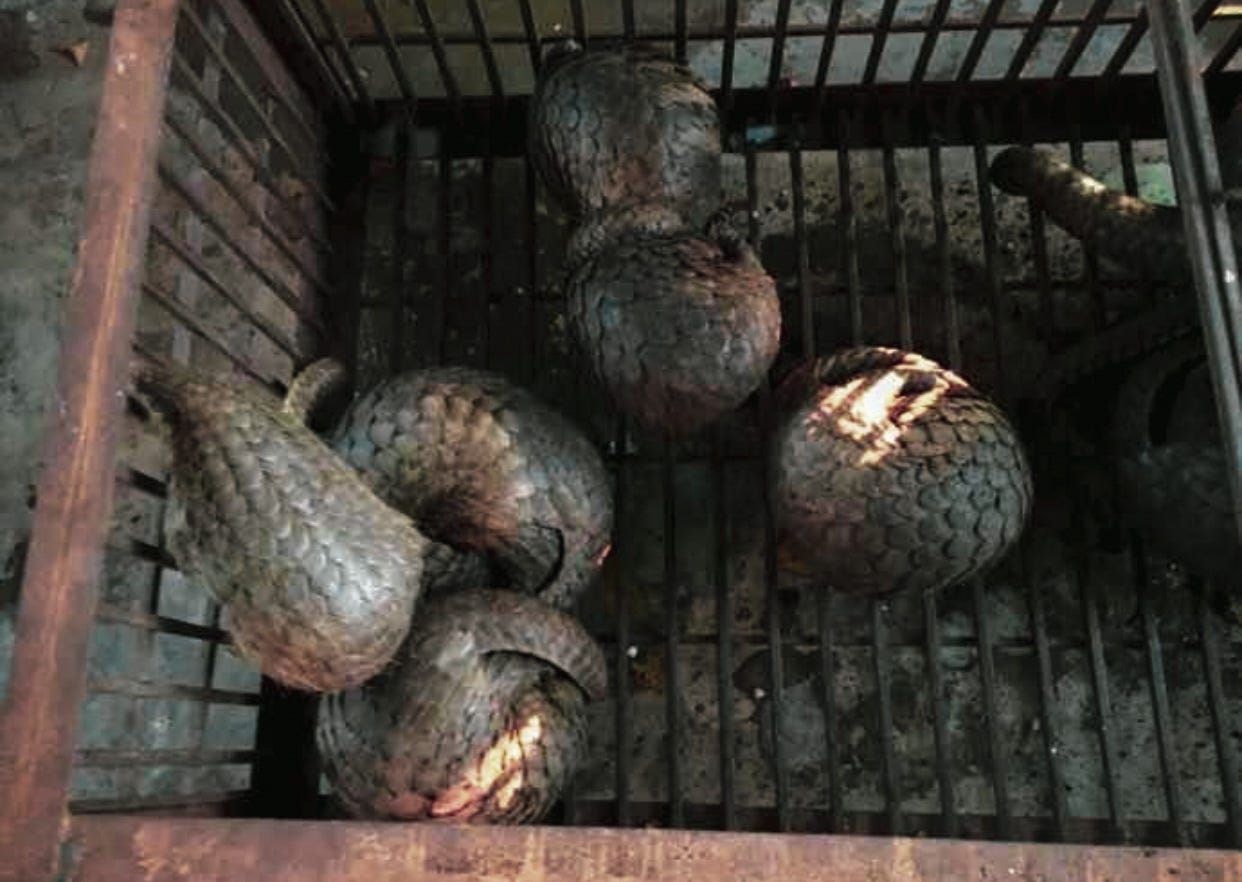Criminal syndicates in Africa and Asia are working together — and competing — to meet the seemingly insatiable demand for pangolins in China and other markets. Over the last nine months, over 30 journalists across 14 countries and territories investigated how illegal pangolin trafficking is leading the species to become extinct.
Today, we’re sending you our dispatch from the Vietnamese border to China.
You can find our global report here:
On an early summer morning in the tourist town of Ha Long, we meet a man surnamed Chen at a bar that will soon turn to its daytime trades of milk tea and currency exchange.
Chen runs a restaurant, but also tries to earn additional cash by showing tourists around and smuggling ivory and pangolins. Born in 1988, he lives alone in a messy apartment on the outskirts of Ha Long. Chen showed three pangolin scales as samples of his trade to us (we were reporting undercover, feigning interest in buying scales). “You can wait at home in China, we deliver to your doorstep,” he said.
His prices depend on provenance. Asian pangolin scales go for 3,200 Chinese renminbi, or around $450, but African scales cost a mere 1,300 renminbi, or $180, per kilogram. Because of the legal risks, he only takes orders above 10 kilograms at those prices. For smaller orders, he would charge a premium.

The pangolin scales Chen showed us as samples of his trade. An expert later told us that the scales came from an Asian pangolin.
His supply comes from Laos. But he claimed he did not know how they went from Africa or elsewhere in Asia to Southeast Asia’s only landlocked country. He boasted that once smuggled to China, his goods, which also include bear paws and ivory tusks, can be delivered across the country, except for the northeastern provinces. Estimated delivery time: four days.
There is an oft-used land route from Laos through Vietnam to China, according to our review of local media reports from 2011 to 2019. Over 3,000 live pangolins have been seized while being trafficked in a total of 44 seizure cases in the land route that extends from Cau Treo at the Laotian border to Móng Cái at the Chinese border.

Data compiled from media reports on pangolin seizures between 2011 and September 2019 show that almost 50 percent of all reported cases of busts in Vietnam took place along the highway connecting the Laotian border in Cau Treo to the Chinese border at Móng Cái. This suggests an established smuggling route.

The border towns of Dongxing and Móng Cái have become wildlife smuggling hubs for pangolin. Residents in these border towns can apply for a special day pass that allows them to cross the border with minimal checks. Investigations show that this often facilitates smuggling activities.
But trade is much bigger by air and sea cargo. Overall, police and customs have confiscated over 43 tons of pangolin scales and over 24 tons of frozen pangolins between 2011 and 2019, according to our review. Anecdotal evidence suggests that the majority of the bulk cargo originated from African countries, including Nigeria and Cameroon.
In our conversations, Chen mentioned the Chinese border town of Dongxing as a major smuggling hub, so we went there. The town, along with its sister town of Móng Cái in Vietnam, has flourished because of the border trade. The two cities are practically one, were it not for the heavy surveillance and fortifications that attempt to control and tax the bustling undeclared border trade.

The town of Dongxing, China, can be seen in the distance from its sister border town of Móng Cái in Vietnam. Here, our undercover journalists discovered an active underground trade route in wildlife including pangolins.
It seems that the crossing of checkpoints here is a mere formality in lives lived on both sides. Residents in both towns said that they used special passes, allowing them to cross the border with minimal checks, as long as their stays were brief and limited to the border area.
On the Vietnamese side, we met Hoang Anh, a taxi driver who previously made a living peddling iPhones bought in China. He showed us a photo of himself with his brother and seven pangolins.

A screenshot of a WeChat post by Hoang Anh, a taxi driver who is also running a side business illegally trading wildlife in Móng Cái.
The photo, dated June, was meant to prove that he could supply the animal at its freshest: alive. His buyers, he said, were mostly people interested in pangolin meat for special meals.
The going rate for pangolins is 1,250 renminbi per kilogram, which brings a live animal of about five kilograms to 5,000-6,000 renminbi. He said that thanks to bribes and connections, delivering to China would not be a problem.
On Saturday, we’ll send you a dispatch from Taiwan.
Here are our previous newsletters: Introduction, Q&A, China, Cameroon, Nigeria, Malaysia, Thai-Malaysian border, Indonesia, Philippines, India and Nepal.
If you have questions or tips, or would like to get in touch with our reporters and editors, just respond to this email.
All text can be re-shared and republished under the following Creative Commons license: Attribution-NonCommercial-NoDerivatives 4.0 International (CC BY-NC-ND 4.0).


